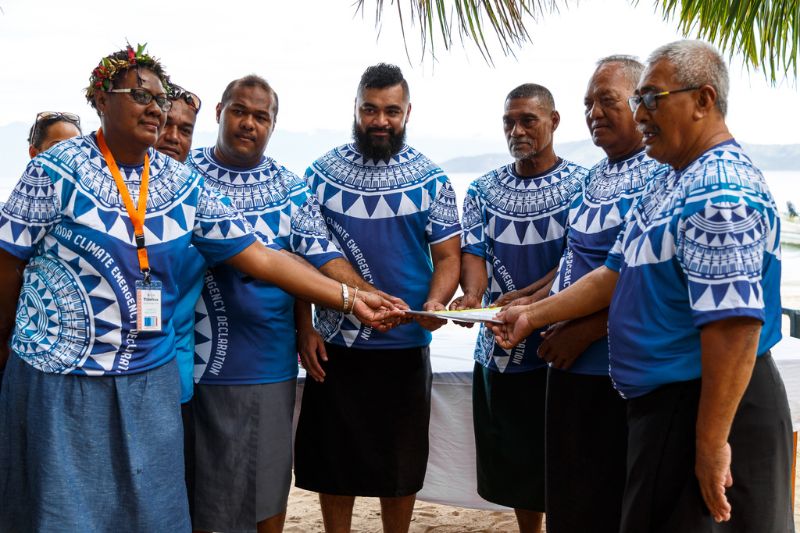Across the Pacific, people are picking up the bones of their ancestors like shells on the beach. Burial grounds are being washed away by rising tides. Communities are shoring up seawalls with old tyres.

I was raised on the beautiful island of Tonga. When I was a child, my parents and grandparents would come out every morning to look at the horizon. They would look at the clouds and see the patterns to understand what laid before us that day.
Nowadays, things are different. Children playing and swimming at the beaches see the patterns in the clouds and run back to alert us to a disaster. This is now becoming a regular occurrence.
After storms, I visit my people and I am always lifted by their resilience and their spirit of helping each other. But when I delve deeper, they share their real emotions, which are full of pain, heartache and fear. You see, in the Pacific our people are strong. We are resilient, but even we have our limits. And we have reached our limit.
Nowadays, when I wake up in the morning and look out to sea, I see two clouds. Two dark and looming clouds. One is climate change. This cloud brings rising sea levels, more frequent cyclones and king tides like we have never seen before.
It is joined by another cloud. This one is debt. Increasingly frequent and severe weather means that Pacific Island nations are struggling to rebuild. We feel like we are going backwards.
'We need the Loss and Damage fund to truly listen to Pacific Island communities. It must be accessible to those who need it, and not push countries further into debt that we can ill afford.'
Vital infrastructure such as homes, bridges, farms and fisheries, take years to rebuild while crops and livestock take a similar period to restore. It is extremely expensive, and it is money we simply don’t have.
Last year at the United Nations climate talks, nations agreed on a Loss and Damage fund; a fund created to compensate developing countries impacted by climate change, like my home of Tonga in the Pacific Island nations.
We don’t contribute much to climate change. In fact, we contribute less than 0.5 per cent of all global emissions. But we certainly pay for it in our futures, and the futures of our children. We need compensation for this injustice.
The Loss and Damage fund is an important step towards climate justice, but we can’t forget that the 2009 pledge to spend $100 billion a year in climate aid has still not been met. In fact, the pledge to spend $100 billion a year is far from achieved.
Right now, the Pacific region needs nearly US $1 billion per year in financing to adapt our infrastructure to climate change. We receive much less than this.
Unfortunately, even when money is sent to the Pacific for climate change adaptation and mitigation, it is spent in a questionable manner. Large infrastructure projects like wharfs and airports have taken up over US $300 million in funds intended to address climate change in the Pacific yet contribute more to economic development than helping communities adapt to climate change.
I hear from communities in Tonga, Papua New Guinea’s Admiralty Islands, Fiji, Kiribati, Tuvalu and Samoa who face serious challenges in accessing funds; challenges like lengthy accreditation delays, or onerous and complex grant application processes.
Women and disability groups rarely know what options might be available to them, and it isn’t easy to figure it out either. To properly support and compensate the Pacific region, funds must reach the right people in a timely fashion, before our homes, livelihoods and culture are destroyed forever by climate change.
‘Loss and Damage’ is at its heart about climate injustice. Loss and Damage is meant to pay for the intangible as well as the tangible, for the loss not just of my home, but for the loss of my ancestors’ graves, for the loss of the way of life that I grew up with on this beautiful island, which is slowly being worn away by rising tides and disasters.
We need the Loss and Damage fund to truly listen to Pacific Island communities. It must be accessible to those who need it, and not push countries further into debt that we can ill afford. It must prioritise the most vulnerable, including women and girls, children, the elderly and people living with disabilities.
The global community has an ethical and moral obligation to support Pacific Island countries to adapt to climate change. We are at a critical time in our fight for climate resilience, especially in the Pacific which is facing existential threats. Put simply, it is now or never. The real challenge for the world is to see with their eyes, and listen with their ears, to those on the frontlines of climate change. Listen, see, then act, and act now before it is too late.
Cardinal Soane Patita Paini Mafi is the first ever cardinal from Tonga and the youngest member of the College of Cardinals. He is also the President of Caritas Oceania and represents the region on key issues, especially climate change.
Main image: Agreeing to the Kioa Declaration, when Pacific groups came together to discuss their shared issues in the region prior to COP27. (Caritas Australia)